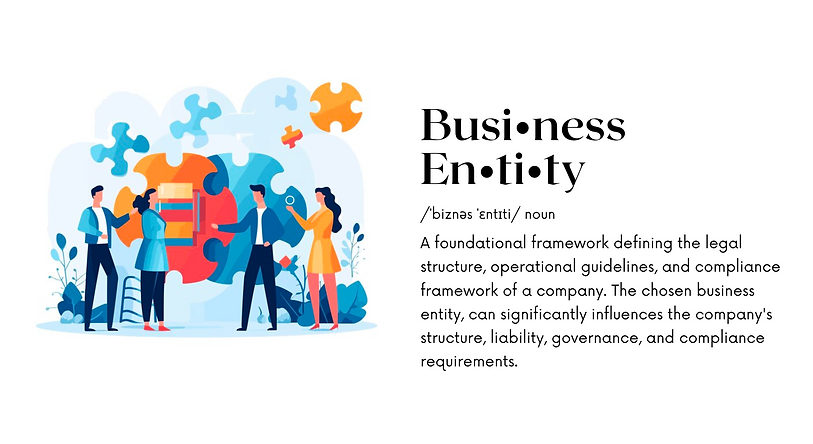Introduction
Choosing the correct legal entity for your business is critical in establishing a solid foundation for your venture. The legal entity determines your company's structure, liability, governance, and compliance requirements. This guide provides a comprehensive overview of the administrative steps in selecting the appropriate legal entity in Malaysia for your business. Here are the steps:-

Key Highlights:
Define Your Objectives: Clearly establish your business's purpose, goals, and services to align with the legal entity that best suits your vision.
Explore Entity Options: Familiarize yourself with Malaysian business entities, such as sole proprietorship, partnership, private limited company (Sdn Bhd), and others, understanding their characteristics and suitability.
Professional Guidance: Engage legal, accounting, and tax professionals to navigate the complexities of Malaysian business laws, ensuring informed decision-making.
Assess Liability and Tax Implications: Evaluate liability, risk factors, and tax implications associated with each entity, considering factors like limited liability protection and tax benefits.
Compliance and Governance: Understand governance and compliance requirements, annual filing obligations, and funding considerations. Register and incorporate your chosen entity following the regulatory guidelines.
Define Your Objectives
It is essential to begin by defining your objectives to ensure a smooth administrative process. Take the time to establish the purpose and goals of your business clearly, as well as determine the services you plan to offer and identifying your target audience. This level of clarity will significantly assist you in selecting the legal entity that best aligns with your vision.
Familiarise Yourself with Different Business Entities
To develop familiarity with Malaysian business entities, one should explore the range of legal entity options available in Malaysia. These options include sole proprietorship, partnership, private limited company (Sdn Bhd), public limited company (Berhad), limited liability partnership (LLP), non-profit organisation (NPO), and cooperative. Conducting thorough research on the characteristics, advantages, and disadvantages of each entity type is essential to understanding how they align with your specific objectives and legal requirements.
Seek Professional Advice
To make the administrative process smoother and gain valuable insights tailored to your specific situation, it is advisable to engage professionals who specialise in Malaysian business and company law. Seek guidance from legal, accounting, and tax experts with expertise in this field. They can assist you in understanding the legal obligations, financial implications, and compliance requirements for each available legal entity option in Malaysia. Their expertise will help you navigate the complexities of Malaysian business laws effortlessly.
Assess Liability and Risk Factors
Consider the liability and risk factors associated with each legal entity option in Malaysia. Some entities, such as private limited companies (Sdn Bhd) and LLPs, offer limited liability protection, shielding personal assets from business liabilities. Others, like sole proprietorships and partnerships, do not provide this separation. Assess the level of risk your business may encounter and choose an entity that offers appropriate protection.
Evaluate Tax Implications
Examine the tax implications of each legal entity option in Malaysia. Research how different entities are taxed, including income tax, service tax, and withholding taxes. Understand each entity type's tax benefits, exemptions, and obligations. Consult a tax professional to ensure compliance with local tax laws and optimise tax planning for your business.
Consider Governance and Compliance Requirements
Evaluate the governance and compliance requirements for each legal entity in Malaysia. Understand the reporting obligations, annual filing requirements, and compliance procedures associated with each entity type. Private limited companies (Sdn Bhd), public limited companies (Berhad), LLPs, and NPOs have specific regulations to adhere to. Familiarise yourself with the rules and obligations to ensure smooth operations and avoid penalties.
Funding and Financing Considerations
Assess the funding and financing options available for your business in Malaysia. Different legal entities may have varying grants, loans, and investment eligibility. Research the requirements and limitations of each entity type to identify the most suitable option that aligns with your financial objectives.
Register and Incorporate Your Chosen Entity
Once you have decided on the appropriate legal entity for your business, proceed with registering and incorporating the entity according to the specific requirements outlined by the Companies Commission of Malaysia (SSM) or other relevant authorities. Follow these administrative procedures: prepare the required documents, submit applications, and fulfil the registration fees.
Conclusion
Choosing the correct legal entity for your business in Malaysia requires careful consideration of your objectives, liabilities, tax implications, compliance obligations, and funding requirements. You can make an informed decision by following the administrative steps outlined in this guide, including defining your objectives, seeking professional advice, assessing liability and risk factors, and understanding tax and compliance obligations. Stay updated with the latest regulations and consult professionals to ensure compliance with Malaysian laws. With a well-chosen legal entity, you can establish a strong foundation for your company's success and growth.
Bonus Tips
Engaging a corporate secretary during the company registration process in Malaysia offers small business owners expert guidance, administrative support, compliance assistance, and valuable insights into corporate governance. A corporate secretary ensures smooth registration, provides ongoing support for compliance obligations, and establishes a strong foundation for business success. Outsourcing this role is common, especially for SMEs lacking resources for a full-time in-house secretary. Key benefits include navigating complex legal requirements, handling administrative tasks, and aiding in post-registration compliance. Hiring a corporate secretary early, choosing a reputable one, and maintaining a long-term relationship ensure continued support for sustained growth and success.






